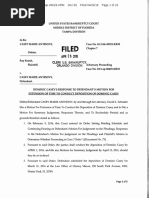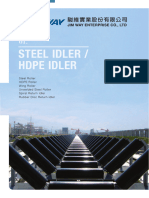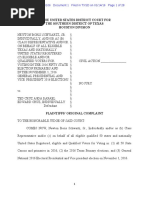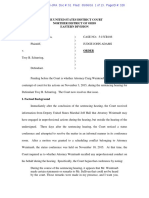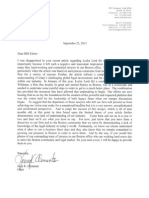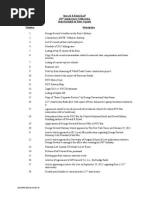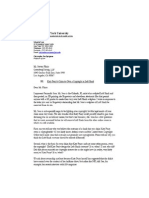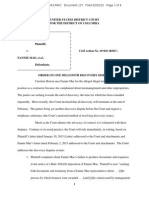Regal and Hillis v. Butler & Hosch
Regal and Hillis v. Butler & Hosch
Uploaded by
Staci ZaretskyCopyright:
Available Formats
Regal and Hillis v. Butler & Hosch
Regal and Hillis v. Butler & Hosch
Uploaded by
Staci ZaretskyOriginal Description:
Copyright
Available Formats
Share this document
Did you find this document useful?
Is this content inappropriate?
Copyright:
Available Formats
Regal and Hillis v. Butler & Hosch
Regal and Hillis v. Butler & Hosch
Uploaded by
Staci ZaretskyCopyright:
Available Formats
Case 0:15-cv-61081-BB Document 1 Entered on FLSD Docket 05/21/2015 Page 1 of 13
UNITED STATES DISTRICT COURT
SOUTHERN DISTRICT OF FLORIDA
Case No.:
STEPHEN REGAL and GIANNA HILLIS,
individually and on behalf of all other
similarly situated individuals,
Plaintiffs,
vs.
BUTLER & HOSCH, P.A.
Defendant.
________________________________________/
CLASS ACTION COMPLAINT
Plaintiffs Stephen Regal and Gianna Hillis individually and on behalf of all others
similarly situated, through counsel, bring this action in their individual capacities and
on behalf of the class of persons similarly situated as defined below and for their
Complaint allege, pursuant to their own knowledge, or where there is no personal
knowledge, upon the investigation of counsel and/or upon information and belief, to
wit:
1.
NATURE OF CASE
This action seeks to recover back pay and benefits under 29 U.S.C. 2101
et seq. the WARN Act to redress the conduct by Defendant Butler & Hosch, P.A.
Butler & Hosch , that terminated more than seven hundred 700 employees without
proper legal notice as part of a mass layoff on May 14, 2015 in Miami, Florida and
Defendants other sites. Defendants mass layoff deprived hundreds of fired workers
and their families some transition time to adjust to the prospective loss of employment,
1
Case 0:15-cv-61081-BB Document 1 Entered on FLSD Docket 05/21/2015 Page 2 of 13
to seek and obtain alternative jobs and, if necessary, to enter skill training or retraining
that will allow these workers to successfully compete in the job market. 20 C.F.R.
639.1 a .
2.
Butler & Hosch failed to provide these terminated employees with the sixty
60 days advance written notice that is required by the Worker Adjustment and
Retraining Notification Act, 29 U.S.C. 2101 et seq. WARN Act .
3.
Butler & Hosch is a law firm specializing in the legal needs of the mortgage
banking industry. Butler & Hosch practice areas include Foreclosure, Bankruptcy,
Litigation, Loss Mitigation, REO, Title, and Eviction.
4.
This Court has jurisdiction pursuant to 28 U.S.C. 1331, 1334 and 1367, as
well as 29 U.S.C. 2102, 2104 a 5 .
5.
Venue over this matter is appropriate in this Court pursuant to 29 U.S.C.
2104 a 5 because the acts constituting the violation of the WARN Act occurred, and
the claims arose in this district. Venue is also proper under 28 U.S.C. 1391 a and
b . The acts complained of occurred in the State of Florida and, at all relevant
times, material hereto, Butler & Hosch maintained an office in this district, conducted
business in this district, and a substantial part of the events or omissions giving rise to
this action occurred in this judicial district.
PARTIES
Plaintiffs
6.
Plaintiff, Stephen Regal, is and was at all material times relevant hereto, a
resident of Broward county, Florida, sui juris, and a fulltime employee of Butler &
2
Case 0:15-cv-61081-BB Document 1 Entered on FLSD Docket 05/21/2015 Page 3 of 13
Hosch, at the time he was terminated on May 14, 2015.
7.
Plaintiff, Giana Hillis, is and was at all material times relevant hereto, a
resident of Broward county, Florida, sui juris, and a fulltime employee of Butler &
Hosch, at the time she was terminated on May 14, 2015.
8.
At all times relevant and material hereto, all Plaintiffs and class members
were either full time employees of Butler & Hosch, or they were temporary employees,
other than parttime employees, and are to be counted in determining that the
threshold requirements of the WARN Act are met.
9.
Plaintiffs were Butler & Hosch employees who, in addition to other
substantial employee benefits, earned regular compensation and were damaged by
Butler & Hoschs violations of the WARN Act.
10.
The individual plaintiffs identified in the above paragraphs will be known
collectively hereinafter as Plaintiffs.
Defendant
Butler & Hosch, P.A.
11.
Butler & Hosch maintains a website on which it touts itself as providing
distinguished singlepoint of contact, cradletograve service in all aspects of real estate
and mortgage servicing law and claims that it received a Best in State award for
foreclosure and bankruptcy.1
FACTS
12.
Plaintiffs and Class Members were terminated by Butler & Hosch on May 14,
1 http://www.butlerandhosch.com/index.php/aboutus/
Case 0:15-cv-61081-BB Document 1 Entered on FLSD Docket 05/21/2015 Page 4 of 13
2015.
13.
On May 14, 2015, Butler & Hosch terminated approximately 700 employees,
without providing them with the sixty days notice required under the WARN Act.
14.
The Plaintiffs were full time employees as used in the Act.
15.
The class members, who were temporary employees, other than parttime
employees, are counted as employees as used in the Act because the contract for
temporary employment was a part of a long term relationship between Defendant,
temporary employees and their agents.
16.
All of the Plaintiffs were affected employees as used in the Act and suffered
an employment loss as defined by the Act.
17.
In the time prescribed by the Act, Butler & Hosch permanently terminated
the affected employees.
18.
Further, more than 50 employment losses occurred during a single 30 day
period.
19.
The statutory period under the WARN Act began on February 20, 2015
which is sixty 60 calendar days before the first employment losses began on May 14,
2015.
20.
On or about May 14, 2015, Robert Hosch, CEO of Butler & Hosch sent an email
Termination Email to employees, advising them that the firm was closing, that their
positions were terminated, and that they would not be paid for the previous three weeks.
21.
The Termination Email stated, in part, the following:
It is with great sadness that I report to all of you regarding the difficult
4
Case 0:15-cv-61081-BB Document 1 Entered on FLSD Docket 05/21/2015 Page 5 of 13
financial status of Butler & Hosch and its affiliates BH which has
resulted in the filing of the state court Assignments for the Benefit of
Creditors ABC . I have voluntarily stepped down as CEO and Senior
Partner of BH. The control of the BH companies has been voluntarily
placed in the hands of an experienced thirdparty fiduciary, Mr. Michael
Moecker.
How does the filing of these ABCs cases impact you? Though Mr.
Moecker has complete access to our assets, he will not have sufficient
cash on hand to fund payroll at the end of this week. Without BH
employees and attorneys there is no ongoing operation. BH cannot
continue to function. To be clear, while I continue to hold out hope that
our existing lender and/or strategic partners may provide an infusion
of cash today, without it, BH will have no choice but to close its doors
immediately.
22.
In the Termination Email, Hosch further stated that Butler & Hosch grew too
fast and could not merge processes from the aqcuired entities quickly enough to meet our
economic forecasts, which resulted in short term cash crunches and our ability to attract
new capital in the interim.
23.
Upon information and belief, Butler & Hosch knew that terminations were
anticipated, but failed to provide employees, nor State and Local authority with
advance notice as required under the WARN Act.
24.
Butler & Hosch reportedly terminated dozens of employees in December,
2014.
25.
The employees terminated on May 14, 2015 were not provided with
advance notice but were terminated by an email sent to them the same day.
26.
Again the employees were provided with no notice, severance, and barely an
opportunity to gather their personal items before security badges and telephone
extensions were deactivated.
Case 0:15-cv-61081-BB Document 1 Entered on FLSD Docket 05/21/2015 Page 6 of 13
27.
Plaintiffs and other terminated employees incurred expenses directly
related to performing their duties or following the directions of Butler & Hosch. Butler
& Hosch has failed to reimburse Plaintiffs and other terminated employees these
reimbursable expenses.
28.
By failing to disclose their true intentions to make mass layoffs in advance,
Butler & Hosch deceived their employees from looking for other work and/or making
contingent plans while Butler & Hosch continued to operate unabated.
29.
As a result of Butler & Hoschs discontinuance of service of employees
without notice, hundreds of jobs in the South Florida Area have been lost.
CLASS ACTION ALLEGATIONS
30.
Plaintiffs bring this action as a class action under Federal Rule of Civil
Procedure 23 a , b 1 and 3 and the WARN Act 29 U.S.C. 2104 a 5 .
31.
Plaintiffs bring this action for themselves and on behalf of a class of all
similarly situated employees. The Class or Class Members Plaintiffs seek to certify
are defined as:
All employees of Butler & Hosch, P.A. who were terminated from employment at
Butler & Hosch without being provided sixty 60 days written notice of a mass
layoff before the date of their termination. Excluded from the Class are any part time
employees.
32.
Excluded from the Class are Butler & Hosch and the legal representatives,
heirs, successors and assigns of any excluded person and members of the federal
judiciary.
33.
Upon information and belief, Plaintiffs estimate that the class comprises at
least seven hundred 700 Class Members and the Class is so numerous that joinder of
6
Case 0:15-cv-61081-BB Document 1 Entered on FLSD Docket 05/21/2015 Page 7 of 13
all Class Members is impracticable. The members of the class can be identified and
located using information contained in the Defendants human resources records.
34.
There are common questions of law and/or fact common to the class that
predominate over any questions affecting only individual Class Members. The
questions of law and fact common to the class arising from Defendants actions
include, but are not limited to the following:
a. Whether the provisions of the WARN Act apply;
b. Whether Plaintiffs and Class Members are affected employees as used
in the Act;
c. Whether Butler & Hoschs employee terminations on May 14, 2015
constitute a termination and/or mass layoff under the WARN Act;
d. Whether Butler & Hosch failed to provide the notices required by the
WARN Act 29 U.S.C. 2102 b ;
e. Whether Butler & Hosch can avail itself of any of the provisions of the
WARN Act which permit lesser periods of notice;
f. The appropriate formulae to measure damages under the WARN Act 29
U.S.C. 2104 a 2 ; and
g. The appropriate definitions and formulae to measure payments to
potentially offset damages under the WARN Act 29 U.S.C. 2104 a 2 .
35.
Plaintiffs claims are typical of those of the Class Members. Plaintiffs and
the Class Members were subjected to the same kind of unlawful conduct and the claims
of Plaintiffs and the Class Members are based on the same legal theories and questions
of law and fact pursuant to the WARN Act.
7
Case 0:15-cv-61081-BB Document 1 Entered on FLSD Docket 05/21/2015 Page 8 of 13
36.
Plaintiffs will fairly and adequately protect the interests of the class the
Plaintiffs represent. Plaintiffs interests do not conflict with the interests of the class,
and the Plaintiffs intend on prosecuting this action vigorously.
37.
Plaintiffs have retained experienced counsel qualified in class litigation and
counsel are competent to assert the interests of the class.
38.
The unlawful acts of Butler & Hosch, as alleged herein, constitute a course
of conduct common to Plaintiffs and each Class Member. Prosecution of separate
actions by individual Class Members would create a risk of inconsistent of varying
adjudications which would establish incompatible standards of conduct for Defendants
and/or substantially impair or impede the ability of the individual Class Members to
protect their interests.
39.
Upon information and belief, Defendants, and each of them, have acted or
refused to act on grounds generally applicable to the Class.
40.
Questions of law and/or common to the Class Members, including the
issues identified above, predominate over questions affecting only individual Class
Members, and a class action is superior to other available methods for fair and efficient
adjudication of the controversy. Class action treatment will allow a large number of
similarly situated individuals to simultaneously pursue their common claims in a
single forum in an efficient manner, without unnecessary duplication of effort and
expense that would be required if numerous individual actions were pursued.
However, the affected employees must optin to this litigation so that his or her right to
damages can be determined and quantum of damages can be calculated by the court.
8
Case 0:15-cv-61081-BB Document 1 Entered on FLSD Docket 05/21/2015 Page 9 of 13
COUNT I
Violations of the United States Worker Adjustment and Retraining Notification Act
41.
Plaintiffs, on behalf of themselves and other persons similarly situated,
repeat and reallege the allegations of the preceding paragraphs as if fully restated
herein.
42.
At all times material herein, Plaintiffs, and similarly situated persons, have
been entitled to the rights, protections and benefits provided under the WARN Act, 29
U.S.C. 2101 et seq.
43.
The WARN Act regulates the amount of notice an employer must provide to
employees who will be terminated due to mass layoffs, as well as the back pay and other
associated benefits an affected employee is due based on a violation of the required
notice period.
44.
Butler & Hosch was, and is, subject to the notice and back pay requirements
of the WARN Act because Defendants, individually and collectively are a business
enterprise that employs 100 or more employees, excluding parttime employees, as
defined in the Act. 29 U.S.C. 2101 1 A .
45.
Defendants willfully violated the WARN Act by failing to provide the required
notice.
46.
Section 2103 of the WARN Act exempts certain employers from the notice
requirements of the Act. 29 U.S.C. 2103 1 2 . None of the WARN Act exemptions
apply to Defendants failure to provide required notice to Plaintiffs and Class Members.
Accordingly, Plaintiffs and Class Members must receive the notice and back pay
9
Case 0:15-cv-61081-BB Document 1 Entered on FLSD Docket 05/21/2015 Page 10 of 13
required by the WARN Act 29 U.S.C. 2101 1 A .
47.
Plaintiffs and Class Members have been damaged by Defendants conduct
constituting violations of the WARN Act and are entitled to damages for their back
pay and associated benefits for each day of the violation. Defendant has not acted
in good faith nor with reasonable grounds to believe their acts and omissions were
not a violation of the WARN Act.
48.
Defendant did not announce their operational restructuring until after it
began mass layoffs of its employees.
49.
Defendant, it subsidiaries and agents made false representations and
statements even before sending out its letters of terminations or the WARN Notice
finally filed with the State of Florida on or about November 9, 2010.
50.
Notice was required to be received, not merely given, sixty 60 calendar
days before separation, and although most employees received their notice by
electronic mail communication, they were only given a matter of hours or less to
gather their personal belongings, which is a further violation of the Act.
51.
Defendant knew of should have known that their own conduct was the
cause of the actual change in business circumstance, as evidenced by their public
statements, and were thus foreseeable.
52.
Defendant cannot allege in good faith that the terminations were
unforeseeable due to business circumstances as the circumstances were a not
unexpected conditions outside the employers control and therefore, b not sudden or
dramatic but in part because of their very own actions which they knew of long before
the terminations
10
Case 0:15-cv-61081-BB Document 1 Entered on FLSD Docket 05/21/2015 Page 11 of 13
53.
Defendant had plenty of advance opportunity to provide notice to Plaintiffs
and Members of the Class of the potential for mass layoffs and/or terminations, and
instead willfully chose to remain silent in violation of the WARN Act.
54.
Defendant is an employer as used in WARN.
55.
Plaintiffs are affected employees as defined under the WARN Act. 29 U.S.C.
2101 a 5 .
56.
None of the affected employees were provided advance written notice or in
the alternative appropriate pay and benefits due under the WARN Act.
57.
Some of the affected employees were constructively discharged by
Defendants.
58.
Defendant was aware of its liability under the WARN Act notice and payment
requirements and wrongfully and knowingly failed to provide notice as required for
their own economic gain.
59.
Business circumstances do not absolve the Defendant of liability under the
Act.
60.
Each Plaintiff is entitled to the amount of back pay and benefits for the period
of the violation of the Act by Defendant.
61.
Plaintiffs have been required to retain counsel in this matter to protect
Plaintiffs rights and have incurred attorneys fees and costs in this matter.
PRAYER FOR RELIEF
WHEREFORE, Plaintiffs demand judgment against Defendant and an Order
providing for:
A.
Certification of the Class pursuant to Rule 23 of the Federal Rule of Civil
11
Case 0:15-cv-61081-BB Document 1 Entered on FLSD Docket 05/21/2015 Page 12 of 13
Procedure; certifying Plaintiffs as representatives of the Class and designating their
counsel of record as counsel for the Class;
B.
Finding that the Defendant Butler & Hosch has violated the WARN Act and
therefore holding Defendant liable to Plaintiffs and the Class in an amount to be
determined;
C.
Compensatory damages in an amount equal to at least the amounts
provided by the WARN Act 29 U.S.C. 2104 a ;
D.
A judgment in favor of Plaintiffs and the other similarly situated former
employees equal to the sum of: their unpaid wages, salary, commissions, bonuses,
accrued holiday pay, accrued vacation pay, all accrued paid time off, pension and 401 k
contributions and other COBRA benefits, for 60 days, that would have been covered and
paid under the thenapplicable employee benefit plans had that coverage continued for
that period, all determined in accordance with the WARN Act, 29 U.S.C.A.
2104 a 1 A , all unreimbursed expenses advanced by Plaintiffs and Class Members,
including any civil penalties;
E.
Reasonable attorney fees and costs;
F.
Prejudgment interest as may be determined by statute and rule;
G.
Leave to amend this complaint to add state law claims should it prove
necessary; and
H.
Such other and further relief as the Court may deem necessary or appropriate
//
Remainder of page intentionally left blank
12
//
Case 0:15-cv-61081-BB Document 1 Entered on FLSD Docket 05/21/2015 Page 13 of 13
DEMAND FOR JURY TRIAL
Plaintiffs, on behalf of themselves and all others similarly situated, hereby
demand a trial by jury of all issues so triable.
Dated: May 21, 2015
Respectfully submitted,
/s/ Seth M. Lehrman
Gary M. Farmer Fla. Bar No. 914444
Email: gary@pathtojustice.com
Steven R. Jaffe Fla. Bar No. 390770
Email: steve@pathtojustice.com
Mark S. Fistos Fla. Bar No. 909191
Email: mark@pathtojustice.com
Seth M. Lehrman Fla. Bar No. 132896
Email: seth@pathtojustice.com
FARMER, JAFFE, WEISSING,
EDWARDS, FISTOS & LEHRMAN, P.L.
425 N. Andrews Ave., Suite 2
Fort Lauderdale, Florida 33301
Telephone: 954 5242820
Facsimile: 954 5242822
Attorneys for Plaintiffs
13
You might also like
- Fuck This CourtDocument34 pagesFuck This CourtSarah Jeong88% (33)
- Beast Games LawsuitDocument54 pagesBeast Games LawsuitTHRNo ratings yet
- Starbucks Underfilled Latte LawsuitDocument24 pagesStarbucks Underfilled Latte LawsuitEater68% (69)
- Notice of Conditional AcceptanceDocument11 pagesNotice of Conditional AcceptanceMichael Kovach100% (13)
- Plumlee Et Al. v. Steep Hill Inc. Et Al.Document22 pagesPlumlee Et Al. v. Steep Hill Inc. Et Al.sandydocsNo ratings yet
- Finding Ebooks On IrcDocument10 pagesFinding Ebooks On IrcJeff DesaulniersNo ratings yet
- Dominic Casey AffidavitsDocument15 pagesDominic Casey AffidavitsDavid Lohr100% (1)
- Left Shark Cease and DesistDocument2 pagesLeft Shark Cease and DesistSigne BrewsterNo ratings yet
- Federal Court Complaint - Juno LawsuitDocument29 pagesFederal Court Complaint - Juno LawsuitJohana BhuiyanNo ratings yet
- Recent Employment LawDocument468 pagesRecent Employment Lawcynjama10100% (2)
- Soportes Take UP STL Series - Rodamientos SmilovicDocument4 pagesSoportes Take UP STL Series - Rodamientos SmilovicAlejandro SmilovicNo ratings yet
- ZISCO Installs World LongestDocument11 pagesZISCO Installs World LongestJoshua GrahitaNo ratings yet
- Cylinder SelectionDocument20 pagesCylinder SelectionWilson Silva SousaNo ratings yet
- Material FlowDocument11 pagesMaterial Flow42828201No ratings yet
- Chain Installation Best Practices 01 PTLCCPDocument23 pagesChain Installation Best Practices 01 PTLCCPLeonardo LimaNo ratings yet
- Guarding Belt Conveyors (MSHA)Document71 pagesGuarding Belt Conveyors (MSHA)AnsarNo ratings yet
- Fenner Wedge Belt Drive Selection 299 - Friction - WedgebeltdrivesDocument22 pagesFenner Wedge Belt Drive Selection 299 - Friction - WedgebeltdrivesSubramanian ChidambaramNo ratings yet
- Hopper Inserts For Improved Solids FlowDocument4 pagesHopper Inserts For Improved Solids FlowknsaravanaNo ratings yet
- Minutes Bucket Elevator Teleconference October 5 2012Document6 pagesMinutes Bucket Elevator Teleconference October 5 2012Vinod Kumar VermaNo ratings yet
- Bulk Storage Hopper Flow Feeder PDFDocument9 pagesBulk Storage Hopper Flow Feeder PDFRodrigo GarcíaNo ratings yet
- Drummond, Deakin - 1999 - Water-Cooled Hood System For Peirce-Smith Converters and Similar Furnace Vessels - JomDocument2 pagesDrummond, Deakin - 1999 - Water-Cooled Hood System For Peirce-Smith Converters and Similar Furnace Vessels - JomÁlvaro JaraNo ratings yet
- Bucket - elevator-ME Carlos III UDocument9 pagesBucket - elevator-ME Carlos III Ujack-bcNo ratings yet
- WT1200 Weigh Feeder Manual Operations InstallationDocument36 pagesWT1200 Weigh Feeder Manual Operations InstallationNuro NourmyNo ratings yet
- Conveyor Transitions: Michael Cremeens, VP Business Development Member, NIBA Education/Technical Committee MemberDocument7 pagesConveyor Transitions: Michael Cremeens, VP Business Development Member, NIBA Education/Technical Committee MemberPanchoMiyamotoNo ratings yet
- Pneumatic Ship Unloader PDFDocument12 pagesPneumatic Ship Unloader PDFSosten MagwevaNo ratings yet
- IPSS IdlersDocument23 pagesIPSS IdlersHarish KumarNo ratings yet
- E - 7403-9000 - Table of ContentsDocument4 pagesE - 7403-9000 - Table of Contentsraobabar21No ratings yet
- Continuousflow ConveyorsDocument37 pagesContinuousflow ConveyorsEdel Quinn Madali100% (1)
- Bucket ElevatorDocument4 pagesBucket ElevatorMohamed ShehataNo ratings yet
- M-32-42-3000-75-09 Bucket Elevator R.0ADocument17 pagesM-32-42-3000-75-09 Bucket Elevator R.0ASandy Hatsune MikuNo ratings yet
- Dynamic Design of Belt Conveyors: Diploma ThesisDocument256 pagesDynamic Design of Belt Conveyors: Diploma ThesisSanchai_SaNo ratings yet
- On-Line Manual: Vibrator SelectionDocument6 pagesOn-Line Manual: Vibrator Selectiongk_kishoree81No ratings yet
- Shrink Disc TAS SchaeferDocument20 pagesShrink Disc TAS SchaeferFernando Tapia GibsonNo ratings yet
- Brochure - Slide Gate Valve - Pubc-0502-SvDocument2 pagesBrochure - Slide Gate Valve - Pubc-0502-SvedgarspalaciosNo ratings yet
- En8 EquDocument6 pagesEn8 EquPrapa KaranNo ratings yet
- 1.0 Material Flow CharacteristicsDocument4 pages1.0 Material Flow Characteristicsmaskanah_muhammadNo ratings yet
- PALL Gen Filter ClassificationDocument2 pagesPALL Gen Filter ClassificationAnonymous ieWpd823LgNo ratings yet
- Belt Conveyors: Engineering Science and Application Design ForDocument5 pagesBelt Conveyors: Engineering Science and Application Design ForDona DelavegasNo ratings yet
- New SMP For Cable Tray WorkDocument9 pagesNew SMP For Cable Tray WorkGaurav KhandelwalNo ratings yet
- Pencoflex Coupling Assembly and Maintenance: REXNORD S.A / PTP OperationDocument11 pagesPencoflex Coupling Assembly and Maintenance: REXNORD S.A / PTP OperationJOSE INESNo ratings yet
- #16 Conveyor Belt Modulus of Elasticity: at Any Given TensionDocument2 pages#16 Conveyor Belt Modulus of Elasticity: at Any Given TensionpartomaneshNo ratings yet
- Wire Rope SpecificationDocument15 pagesWire Rope Specificationfarichtape channel100% (1)
- Bonfiglioli Reductoare C A F SDocument582 pagesBonfiglioli Reductoare C A F SAgache ValentinNo ratings yet
- The New: Mark Ii Center In-Line 2Document2 pagesThe New: Mark Ii Center In-Line 2Balgo BalgobinNo ratings yet
- Design and Fabrication of Pneumatic Crane StartDocument6 pagesDesign and Fabrication of Pneumatic Crane StartHimani MahetaNo ratings yet
- Bachelor Reflective JournalDocument14 pagesBachelor Reflective JournalduchesslizNo ratings yet
- Modulare Systems For Conveyor PlantsDocument36 pagesModulare Systems For Conveyor Plantsado31No ratings yet
- 3 Date 2 1 0 R e V I S I o N Checked by Checked by Approve DbyDocument2 pages3 Date 2 1 0 R e V I S I o N Checked by Checked by Approve DbyidilfitriNo ratings yet
- Bulk Carriers Cement, Fly AshDocument4 pagesBulk Carriers Cement, Fly AshPeter Marcellus EpeNo ratings yet
- Is 8531 1986Document6 pagesIs 8531 1986Srini KumarNo ratings yet
- Conveyor Design Summary: Helix Technologies Pty LTDDocument23 pagesConveyor Design Summary: Helix Technologies Pty LTDmamatsulsNo ratings yet
- Conveyor Belt FormulasDocument6 pagesConveyor Belt FormulasDomingo GamisNo ratings yet
- Print Close: Machine DesignDocument5 pagesPrint Close: Machine DesignAnonymous CYdagINo ratings yet
- Motox N Operating ManualDocument39 pagesMotox N Operating ManualNina FelaNo ratings yet
- Pompe Cloudio PiterseDocument410 pagesPompe Cloudio PiterseBoucetta Abd ElghafourNo ratings yet
- Test Report: No. AJHG1412004745FT Date: JAN.09, 2015 Page 1 of 4 Hangzhou China Arts Industrial Corp. LTDDocument4 pagesTest Report: No. AJHG1412004745FT Date: JAN.09, 2015 Page 1 of 4 Hangzhou China Arts Industrial Corp. LTDKR123No ratings yet
- Installation and Operating Instructions: Starclean Conveyor Belt Scraper 830, 832 834Document31 pagesInstallation and Operating Instructions: Starclean Conveyor Belt Scraper 830, 832 834Ilhan PehlivanlıNo ratings yet
- Cortador de Muestras RamseyDocument4 pagesCortador de Muestras RamseyalexNo ratings yet
- Existing Steel Railway Bridges Evaluation PDFDocument8 pagesExisting Steel Railway Bridges Evaluation PDFGuilherme AlencarNo ratings yet
- NIBA Belt Line December 2015Document17 pagesNIBA Belt Line December 2015NIBA- The Belting AssociationNo ratings yet
- Idler and RollerDocument7 pagesIdler and RollerManh PhamNo ratings yet
- Analysis of A Grain Motion in The Transfer Area of The Belt ConveyorDocument14 pagesAnalysis of A Grain Motion in The Transfer Area of The Belt ConveyorczoobsNo ratings yet
- Stewart Et Al V Bankers Healthcare Group LLC Et AlDocument19 pagesStewart Et Al V Bankers Healthcare Group LLC Et AlAlina WeberNo ratings yet
- In Re Johnson, Memorandum of Decision and Order, Case No. DG 15-02000 (Bankr. W.D. Mich, June 16, 2014)Document12 pagesIn Re Johnson, Memorandum of Decision and Order, Case No. DG 15-02000 (Bankr. W.D. Mich, June 16, 2014)BrownBananaNo ratings yet
- Complaint CFPB V Hanna GA ND+201407XXDocument14 pagesComplaint CFPB V Hanna GA ND+201407XXFlaCrackerNo ratings yet
- D.A. v. Hogan. Memorandum OpinionDocument14 pagesD.A. v. Hogan. Memorandum OpinionChris BerinatoNo ratings yet
- Verified Motion To Set Aside The Default and Vacate The Trial Date With Attached Motion To DismissDocument38 pagesVerified Motion To Set Aside The Default and Vacate The Trial Date With Attached Motion To DismissBarry Eskanos100% (1)
- WPS-246627216 - 613let 7Document5 pagesWPS-246627216 - 613let 7Richard HobbsNo ratings yet
- Cruz Birther LawsuitDocument72 pagesCruz Birther LawsuitThe Fiscal TimesNo ratings yet
- Weintraub AdmonishmentDocument13 pagesWeintraub AdmonishmentStaci ZaretskyNo ratings yet
- Jerry Clements: Locke Lord's RebuttalDocument1 pageJerry Clements: Locke Lord's RebuttalStaci ZaretskyNo ratings yet
- Arrest Warrant For Judge Wade NaramoreDocument4 pagesArrest Warrant For Judge Wade NaramoreStaci Zaretsky100% (1)
- Sinclair v. Larson: Brevity BenchslapDocument5 pagesSinclair v. Larson: Brevity BenchslapStaci Zaretsky100% (1)
- Goldberg Segalla: Clive O'Connell BioDocument4 pagesGoldberg Segalla: Clive O'Connell BioStaci ZaretskyNo ratings yet
- Seward & Kissel Time CapsuleDocument1 pageSeward & Kissel Time CapsuleStaci ZaretskyNo ratings yet
- Lola v. Skadden ArpsDocument21 pagesLola v. Skadden ArpsStaci ZaretskyNo ratings yet
- Report and Recommendations: Casey v. Florida Coastal LawDocument39 pagesReport and Recommendations: Casey v. Florida Coastal LawStaci ZaretskyNo ratings yet
- O'Donnell v. Harris: Right-to-Die LawsuitDocument12 pagesO'Donnell v. Harris: Right-to-Die LawsuitStaci ZaretskyNo ratings yet
- Complaint: Lorona v. Arizona SummitDocument96 pagesComplaint: Lorona v. Arizona SummitStaci ZaretskyNo ratings yet
- Criminal Complaint: U.S. v. Sarah E. BuffettDocument5 pagesCriminal Complaint: U.S. v. Sarah E. BuffettStaci ZaretskyNo ratings yet
- Allison Bergman: Disciplinary BriefDocument98 pagesAllison Bergman: Disciplinary BriefStaci ZaretskyNo ratings yet
- Plank Status ReportDocument2 pagesPlank Status ReportjosephlordNo ratings yet
- Alan Dershowitz Slip and Fall LawsuitDocument8 pagesAlan Dershowitz Slip and Fall LawsuitStaci Zaretsky0% (1)
- Cardozo Law: RAMP Fact SheetDocument2 pagesCardozo Law: RAMP Fact SheetStaci ZaretskyNo ratings yet
- Response To Katy Perry's Cease and Desist LetterDocument2 pagesResponse To Katy Perry's Cease and Desist LetterStaci Zaretsky100% (1)
- Teresa Giudice Malpractice Suit Against James KridelDocument11 pagesTeresa Giudice Malpractice Suit Against James KridelAll About The TeaNo ratings yet
- Ethics Opinion Re: Client Solicitation NYDocument6 pagesEthics Opinion Re: Client Solicitation NYStaci ZaretskyNo ratings yet
- Denial of Discharge / in Re: Daniel GordonDocument40 pagesDenial of Discharge / in Re: Daniel GordonStaci ZaretskyNo ratings yet
- Storani v. Arnstein & LehrDocument18 pagesStorani v. Arnstein & LehrStaci ZaretskyNo ratings yet
- Formal Complaint Against Judge J. Cedric SimpsonDocument15 pagesFormal Complaint Against Judge J. Cedric SimpsonWXYZ-TV Channel 7 DetroitNo ratings yet
- AGaTe InterrogatoriesDocument10 pagesAGaTe InterrogatoriesStaci ZaretskyNo ratings yet
- Judge Collyer's Sarcastic Discovery OrderDocument4 pagesJudge Collyer's Sarcastic Discovery OrderStaci ZaretskyNo ratings yet
- Fried Frank 2014 Bonus Announcement MemoDocument1 pageFried Frank 2014 Bonus Announcement MemoStaci ZaretskyNo ratings yet
- Securities Class Action Clearinghouse Press ReleaseDocument3 pagesSecurities Class Action Clearinghouse Press ReleaseDealBookNo ratings yet
- Judicial: Board BAR THEDocument24 pagesJudicial: Board BAR THECape Cod TimesNo ratings yet
- Boss v. CVS Health - Notice of Voluntary DismissalDocument35 pagesBoss v. CVS Health - Notice of Voluntary DismissalThe Type 1 Diabetes Defense FoundationNo ratings yet
- BP America, Inc. v. Oklahoma Ex Rel. Edmondson, 613 F.3d 1029, 10th Cir. (2010)Document13 pagesBP America, Inc. v. Oklahoma Ex Rel. Edmondson, 613 F.3d 1029, 10th Cir. (2010)Scribd Government DocsNo ratings yet
- Clearview AI BIPA LawsuitDocument11 pagesClearview AI BIPA LawsuitTechCrunch100% (1)
- Day v. WDC Exploration & Wells - ComplaintDocument22 pagesDay v. WDC Exploration & Wells - ComplaintbamlawcaNo ratings yet
- Classcollective Actions in The United States OverviewDocument26 pagesClasscollective Actions in The United States OverviewKyle WheelerNo ratings yet
- King City LawsuitDocument16 pagesKing City LawsuitJessica Madeline PaskoNo ratings yet
- Amans v. Tesla Inc. DocumentDocument6 pagesAmans v. Tesla Inc. DocumentCNBC.comNo ratings yet
- Ian Pollard v. Remington Arms Company SettlementDocument46 pagesIan Pollard v. Remington Arms Company SettlementUnited Press InternationalNo ratings yet
- ECF 49 - 1 Memorandum of Law in Support of Plaintiffs' Notice of Motion For Preliminary Settlement Approval and Related ReliefDocument48 pagesECF 49 - 1 Memorandum of Law in Support of Plaintiffs' Notice of Motion For Preliminary Settlement Approval and Related ReliefTMJ4 News100% (2)
- Mfl70960602 Manualowner (En) r32 Ws Us Rev.02 3Document25 pagesMfl70960602 Manualowner (En) r32 Ws Us Rev.02 3redrumcrabsNo ratings yet
- Violetta Mailyan vs. Apple, Class Action of Purposely Slowing IPhonesDocument9 pagesVioletta Mailyan vs. Apple, Class Action of Purposely Slowing IPhonesJack Purcher100% (3)
- Wegmans LawsuitDocument19 pagesWegmans LawsuitNews 8 WROCNo ratings yet
- Amicus Brief Filed by Massachusetts Attorney General Maura Healey and 13 Other AGs in Class Action Suit Against Remington ArmsDocument34 pagesAmicus Brief Filed by Massachusetts Attorney General Maura Healey and 13 Other AGs in Class Action Suit Against Remington ArmsPatrick JohnsonNo ratings yet
- National Company LAw TribunalDocument5 pagesNational Company LAw TribunalAmit GroverNo ratings yet
- Libre ComplaintDocument84 pagesLibre ComplaintGus BovaNo ratings yet
- Fubo subscriber disneyDocument51 pagesFubo subscriber disneyTHRNo ratings yet
- Rhoades - Long Form - NoticeDocument5 pagesRhoades - Long Form - NoticeSpreter & PetiprinNo ratings yet
- Aetna V WolffDocument26 pagesAetna V WolffJakob EmersonNo ratings yet
- Greene-MtGox Mot Prelim App Ex 2 Settlement AgreementDocument50 pagesGreene-MtGox Mot Prelim App Ex 2 Settlement AgreementArs Technica100% (1)
- Abby Windows Files A Specious Motion To Dismiss CounterclaimDocument384 pagesAbby Windows Files A Specious Motion To Dismiss Counterclaimchristopher kingNo ratings yet
- Pastorini Breach of Contract and Malpractice Suit Vs Hausfeld LLPDocument22 pagesPastorini Breach of Contract and Malpractice Suit Vs Hausfeld LLPRobert Lee100% (1)
- UFC Antitrust Lawsuit - Chamber of Commerce Amicus BriefDocument18 pagesUFC Antitrust Lawsuit - Chamber of Commerce Amicus BriefMMA PayoutNo ratings yet
- RTA ComplaintDocument40 pagesRTA ComplaintchrisatcityNo ratings yet






